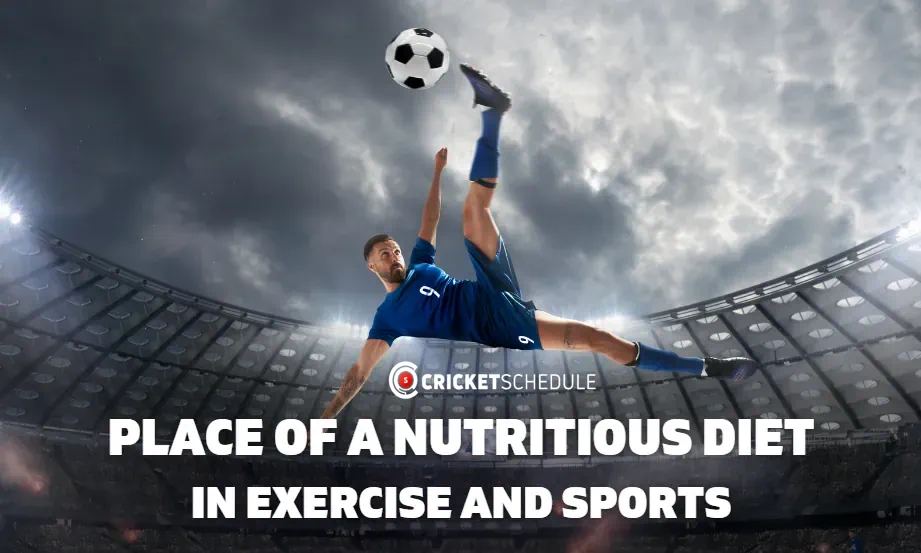
Everyone knows that a proper diet and good health go hand in hand. A nutritionally sufficient diet is the cornerstone of enhanced performance, regardless of whether you are a competitive athlete, weekend sports enthusiast, or committed daily exerciser.
When you do not consume enough calories, carbohydrates, fluids, iron, protein, vitamins, and other minerals, you are more likely to become fatigued and perform poorly during sports or exercise. A nutritious diet gives you the energy and nutrition you need to satisfy the demands of training for physical activity and sports. Nutrition plays a vital role in the latest March Madness odds also.
Benefits of a Nutritious Diet in Exercise and Sports
Healthy eating has many health benefits, which include;
- Increased attention and focus
- Strength to work out longer and harder
- Enhancement of strength and body composition
- It helps with concentration.
- Maintains a healthy immune system
- Minimizes the risk of injury
- Reduces discomfort and fatigue in the muscles
- Muscle repair and regrowth
- Ensuring the best possible recovery following a workout or training regimen
Sources of Foods That Enhance Performance During Sports and Exercise
Protein
Protein is essential for enhancing sports and exercise performance because it can increase glycogen stores and lessen muscle pain. Protein is also necessary for muscles to grow and heal, allowing you to reap the rewards of your activity. Most of the body’s protein comes from the muscles but may also come from other tissues and organs; this protein from the muscle will undergo metabolism if the body can’t acquire all the nutrients it needs from carbs.
You should choose lean animal proteins low in saturated and trans fats, like poultry and fish, for the healthiest options. To avoid meat, you can also try soybeans and legumes like beans, peanuts, and chickpeas. Other good protein sources include cheese, tofu, eggs, and Greek yogurt.
Carbohydrates
Our body’s primary source of energy comes from carbohydrates. Every system in our body, including the brain, heart, muscles, and internal organs, is powered by carbohydrates. A high-carbohydrate diet guarantees that the body will have large quantities of glycogen, enabling the person to train and exercise longer.
Carbohydrate is the primary fuel for the brain and the muscles during exercise. Thus, if one’s diet contains enough of it, it is likely that one’s performance and healing will be fast.
A healthy diet relies heavily on starchy carbohydrates. Consuming the right sorts of carbohydrates is essential. Many people enjoy eating processed meals and sweets because they include simple carbs. Instead, you should concentrate on consuming complex carbohydrates like those in whole grains, beans, fruits, and vegetables.
Fats
The body uses fat primarily as energy when performing lower-intensity exercises. Although it contains many calories, fat is nevertheless necessary for the body in small quantities. If you’re trying to regulate your weight, overeating fat might result in excessive calorie consumption, which can cause weight gain over time.
The type of fat consumed matters a lot. Most of us consume too much-saturated fat, so it is preferable to choose foods that are higher in unsaturated fat and lower in saturated fat because unsaturated fats help supply calories and vital fatty acids to keep you active.
Fat gives you energy and aids in vitamin absorption. Fat is essential for several vitamins (like A, D, E, and K) to work correctly in your body.
Fruits and Vegetables
Fruits and vegetables provide carbs, vitamins, minerals, fiber, water, and antioxidants, which work together to give energy, hydration, digestion, and easy recovery from injury.
When performing cardiovascular and strength-training exercises, the micronutrient content of fruits and vegetables helps to maximize exercise performance, energy synthesis, and tissue recovery. By selecting a variety of fruits and vegetables, you may take advantage of all the vitamins, minerals, and antioxidants that the produce section offers.
Since the body cannot produce certain nutrients like vitamins A, C, and E and minerals like magnesium and potassium naturally, it is essential to consume meals high in fruits and vegetables. These meals supply nutrients, supporting regular physical activity while preserving the immune system’s health and muscle contraction.
Conclusion
You should include plenty of carbohydrates, protein, fruits, and vegetables for your meal to be nutritious. These healthy foods offer energy, enhance muscle performance, and supply nutrients that can significantly impact your performance and general health.
Learning to listen to your body and striking a balance between what feels right and what is healthy for you are the keys to a nutritious diet for sports and exercise.
Also Read:
- India Rocked It: Sachin, Sehwag Laud Men In Blue After Emphatic Win Over Pakistan In T20 World Cup
- T20 World Cup: Suryakumar Hails Ishan’s Responsible 77, Says India Were 15-20 Runs Above Par Against Pakistan
- IND vs PAK: Kishan’s 77 Powers India To 61-Run Win Over Pakistan In T20 World Cup
- IND vs PAK Clash Sees Pakistan’s 18-Over Spin Strategy Join T20 WC Record Books




